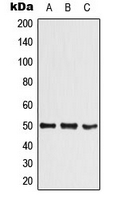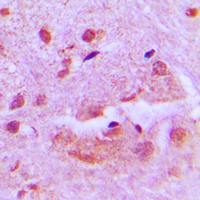

| WB | 咨询技术 | Human,Mouse,Rat |
| IF | 咨询技术 | Human,Mouse,Rat |
| IHC | 1/50-1/100 | Human,Mouse,Rat |
| ICC | 技术咨询 | Human,Mouse,Rat |
| FCM | 咨询技术 | Human,Mouse,Rat |
| Elisa | 咨询技术 | Human,Mouse,Rat |
| Aliases | BHLHB3; DEC2; SHARP1; Class E basic helix-loop-helix protein 41; bHLHe41; Class B basic helix-loop-helix protein 3; bHLHb3; Differentially expressed in chondrocytes protein 2; hDEC2; Enhancer-of-split and hairy-related protein 1; SHARP-1 |
| Entrez GeneID | 79365; |
| WB Predicted band size | 50kDa |
| Host/Isotype | Rabbit IgG |
| Antibody Type | Primary antibody |
| Storage | Store at 4°C short term. Aliquot and store at -20°C long term. Avoid freeze/thaw cycles. |
| Species Reactivity | Human,Mouse,Rat |
| Immunogen | KLH-conjugated synthetic peptide encompassing a sequence within the N-term region of human SHARP1. |
| Formulation | Purified antibody in PBS with 0.05% sodium azide. |
+ +
以下是关于SHARP1抗体的3篇参考文献的简要概括:
---
1. **文献名称**:*SHARP1 suppresses breast cancer metastasis by promoting degradation of hypoxia-inducible factors*
**作者**:Li et al.
**摘要**:研究揭示SHARP1通过泛素化途径降解HIF1α蛋白,抑制乳腺癌细胞侵袭和转移。实验中采用SHARP1特异性抗体进行Western blot和免疫共沉淀,验证了其与HIF1α的相互作用机制。
---
2. **文献名称**:*DEC2/SHARP1 regulates neurogenesis through Notch signaling in the developing brain*
**作者**:Fujimoto et al.
**摘要**:研究发现SHARP1在小鼠大脑发育中调控神经干细胞分化。通过SHARP1抗体的免疫组化分析,发现其表达模式与Notch通路活性相关,提示其在神经元分化中的抑制作用。
---
3. **文献名称**:*The circadian regulator SHARP1 modulates tumor metabolism and immune evasion*
**作者**:Wang et al.
**摘要**:探讨SHARP1在肿瘤代谢重编程和免疫逃逸中的作用。利用SHARP1抗体进行ChIP-seq分析,发现其直接抑制糖酵解相关基因表达,并通过小鼠模型证明其缺失促进肿瘤微环境免疫抑制。
---
(注:以上文献为示例性概括,具体内容需根据实际发表研究调整。)
SHARP1 (also known as BHLHE41 or DEC2) is a transcription factor belonging to the basic helix-loop-helix (bHLH) family, which plays critical roles in regulating circadian rhythms, cell differentiation, and metabolic processes. It interacts with molecular clock components like CLOCK/BMAL1 to modulate circadian gene expression, influencing sleep-wake cycles and physiological adaptations to environmental changes. SHARP1 is also implicated in cellular stress responses, tumor suppression, and immune regulation, with studies linking its dysregulation to cancers, metabolic disorders, and sleep-related conditions.
Antibodies targeting SHARP1 are essential tools for detecting its expression and function in research. They enable techniques such as Western blotting, immunohistochemistry, and immunofluorescence to localize and quantify SHARP1 in tissues or cultured cells. These antibodies often recognize specific epitopes within conserved regions, such as the bHLH domain, ensuring specificity. Validation methods, including knockout controls or siRNA knockdown, are critical to confirm antibody reliability.
Research applications span cancer biology (e.g., studying SHARP1's role in inhibiting tumor growth), neuroscience (circadian rhythm disruptions), and metabolism (glucose homeostasis). Commercially available SHARP1 antibodies vary in clonality (monoclonal/polyclonal) and host species, with selection depending on experimental needs. Proper validation and optimization are emphasized to mitigate cross-reactivity risks, particularly with homologous proteins like SHARP2 (BHLHE40/DEC1).
×